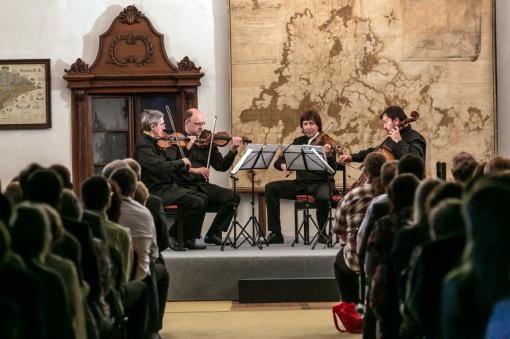One of the biggest promises of the 24th Concentus Moraviae international festival was yesterday’s concert of the legendary Borodin Quartet, whose unique sound is the result not only of hard work but also collaboration with the composer Dmitri Shostakovich. This personal and interpretive trail still influences the group and is passed on to each new member. The programme took place in the library of the castle in Náměšť nad Oslavou , where in the 18th and 19th centuries it was the residence music-loving Haugwitz family. The music of Sergei Prokofiev, Joseph Haydn and Dmitri Shostakovich could be heard by the audience in a venue that was more than merely dignified.
The concert opened with String Quartet No. 2 in F major, Op. 92 by Sergei Prokofiev. At the time it was written, due to forced evacuation, the composer was in Nalchik, capital of the North Caucasus republic of Kabardino. Inspired by the local folk culture the composer incorporated into his work musical elements imitating Caucasian folk instruments and even the musical language of folk music. The composer also made use of a collection of songs from this region, created by Sergei Taneyev. The unusual combination of Caucasian melodies and the distinctive harmonic language of the composer gave rise to a work that is rightly considered one of the gems of the quartet literature. This concise, strongly rhythmic and sometimes even raw piece found absolute understanding in the Borodin Quartet‘s version - predatory rhythmic accents, unapologetic beats col legno and even a certain crisp cynical lightness in interpretation revealed that Russian musicians understand their composers best. Subtle but supporting work with dynamic arcs kept the music in a separate and still anticipatory tension that pervaded the whole composition. The performance of the tunes in the higher ranges between first and second violin in the adagio with deliberate gradation was technically flawless. Here the Borodin Quartet showed that the finest nuances are their special power. Only briefly did the instruments climb to fully expressive communication, for example in the excellent solo from cellist Vladimir Balshin, which thanks to his unique earthiness and grasp rises above everything else.
With a similar expressive subtlety the musicians approached String Quartet Op. 33, No. 5 in G major by Joseph Haydn. In this case the interpreters could not have been accused in the slightest of romanticizing classicist works, but on the other hand the objectification of musical expression in some places was perhaps too sterile. While the introductory Vivace assai movement with its endearing clipped character was grist to the imaginary mill of the Borodin Quartet, the gentler and more elegant movement lacked some of the typical sweetness of Haydn quartets. Indeed, the final movement, which comes from the Italian dance of the Forlan would not have been harmed by greater vivacity, primarily from the first violinist Ruben Aharonian...
In the final piece of the evening – the String Quartet No. 9 in E flat major, op. 117 by Dmitri Shostakovich – the performers returned into the arms of Russian music, which is undoubtedly the focus of the ensemble. Unlike many other ensembles, the musicians understand composer's work not only as a continuously escalating volatile and explosive mixture, in their interpretation the Borodin Quartet také a similar approach to the Prokofiev work. The gentle freely and constantly undulating dynamics were significantly more effective than excessive jumps one way or another. When it came to expressiveness, the musicians got the most out of it. Especially cello solo entry in the last movement, accompanied by the silvery fluttering violin which benefited from the gradual, rather than tectonic, motif gradation. As a rule an ensemble gives a piece a distinctive sound and tries to defend their own way of interpreting it. The Borodin Quartet sought in the present work the author himself. And precisely for that reason the music and the emotional effect of the final string quartet was the biggest.
For almost seventy-five years the Borodin Quartet has not only maintained its reputation, but also the way in which they perform not only works by Dmitri Shostakovich but also other prominent Russian composers. This legacy in connection with a sincere effort to leave as much space as possible to the composer himself gave rise to a unique ensemble, with a technically perfect and artistically refined sound that rightly put it among the most distinguished string quartets of today. On their 70th birthday the quartet brought out a complete cycle of the Shostakovich quartets, and so we can only look forward to how the musicians will celebrate the 75th in the year ahead.
Borodin Quartet
Programme:
Sergei Prokofiev: String Quartet No. 2, Op. 92
Joseph Haydn: String Quartet No. 5, Op. 33
Dmitri Shostakovich: String Quartet No. 9, Op. 117
Náměšť nad Oslavou
castle, library
Thursday 20/6 7.30 p.m.
































No comment added yet..